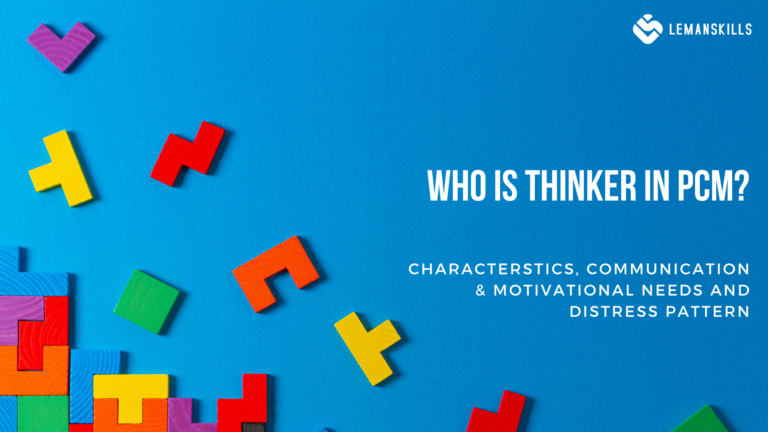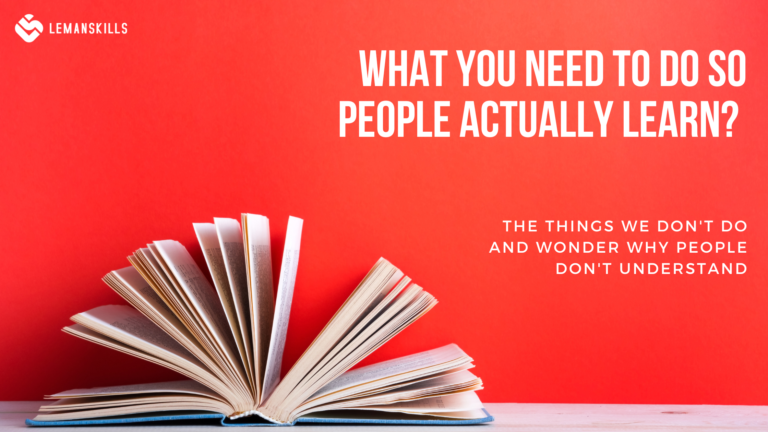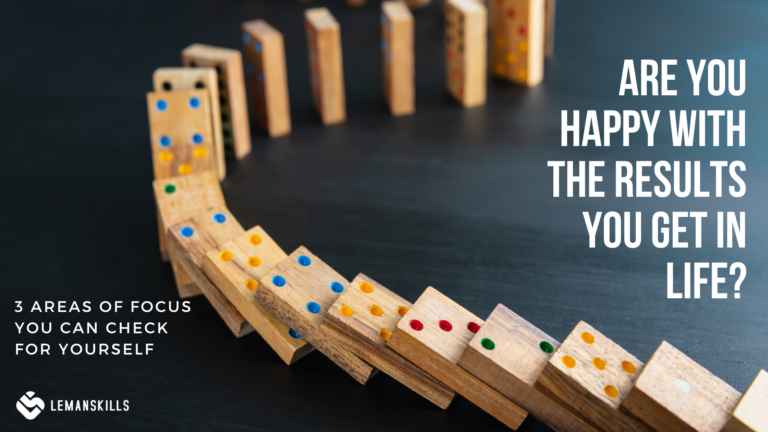
Process Communication Model (PCM): Thinker
Do you have around yourself people that speak data and facts? That connects the dots all the time, since things need to make sense for them? That kind of people that are concrete, to the point and doesn’t what to waste time on meaningless discussions and rather focus on things that matter? That’s the Thinker. The second out of six personality types in Process Communication Model. We’ve started the story about PCM HERE and then we’ve described Persister, as the first stop on our journey to know them all better. Why is it important to characterize all of them? Because thanks to that you’ll know the whole spectrum of the types, so when you talk to somebody, you can make a strong hypothesis about their personality Base to tailor your communication. And because we communicate with others all the time, it’s crucial to have the maximum number of useful tools and practices so we don’t waste time on insufficient communication. At least that’s what the Thinker will say haha. How do we recognize Thinker? Thinker is a person who experience the world through the lens of data, facts and logic. Their perception is thoughts since they use their rational part of themselves the most frequently. They always look for logic in what is happening in their life, when they get a task, project or want to decide on something. The things around them need to have structure, and they want a lot of things to make a structure around them as well. So, things have their own place, they plan their time: privately and professionally. How to recognize a Thinker in the Base of personality? Again, the easiest way to make a strong hypothesis is to look for the key words that the person uses the most. For Thinker it will be: “I think…”, “The data says…”, “The logic says…”, “The logical choice will be…”, “The most accurate solution in this case is…”, “The chart shows that…”, “The data in the report give us…”. They say all of that because for them what’s rational and backed up with data, is valuable. If something has some gaps, there is not enough information, numbers or facts, the Thinker won’t do it. They will look for more evidence, gather more knowledge, examples or cases and then, when they have it all, they are comfortable with making a former decision. The recognition of Thinker is also easier when we look on their non-verbal communication: most of the time their face is “flat”, there’s not a lot of mimics on it. Their voice is rather monotonous, stable, as well as their body. They don’t overspend the energy on moving their bodies or use unnecessary gestures. If you see and hear it, that’s a strong indicator that there’s a Thinker in the Base on the other side of the communication process. How to use it to get along with that kind of person? What does Thinker need in communication? The Thinker needs communication process where they have a chance to express their thoughts. Extremely important for them as well is to have a space, where they can think, connect the dots, create logical solutions to the problems that occur. To be efficient in communication with Thinker, we need to use requestive channel of communication (as we did with the Persister). The difference is that we ask Persister “what do you believe…” and we ask Thinker “what do you think…”. That means that we need to ask questions about their thoughts on a certain subject. Using the same example that we got in the Persister’s case: when we want to delegate a task, so a chosen employee covers it, the great approach will be telling them about it and then ask about their thoughts on it. “Okay, here is a task X… What do you think we need to do to complete it efficiently?” Asking that kind of question is something that we can do to get in contact with the Thinker. Once they are on board, we can talk about the details (scope, deadline, support, required learning etc.). They value Democratic interaction style. It means that they are good in exchanging thoughts, ideas, solutions. They want to be asked on what they think. They like discussions, brainstorming sessions, but only when they are concrete and not too long. One of the worst things that we can do while getting in contact with Thinker is to use directive communication channel, but they also don’t really like the emotive (too much energy) and comforting (they don’t need all those emotions). But especially telling them what to do without even asking is something that they hate. When they have an autocratic person on the other side of the conversation, they go into aggressive behaviors. By being in that zone there is a huge possibility that they’re going to attack other people. So democratic interaction style and requestive communication channel is a key to success in getting on the same page with that person. Thinker seek to answer the existential question: am I competent? It’s good to feed that question, especially when we see that Thinker is under some kind of stress or pressure. For them the following equation is the only truth. I’m competent = I’m valuable as a person Motivational needs attached to this PCM type are recognition of efficient work and time structure. It’s important to know it, since when those needs are not met, Thinker goes into distress and loses access to their skills, abilities to think clearly. Recognition of efficient work means that we are seen as people for what we deliver at work and this delivery is with an exact (or better) outcome that we agreed on. Time structure means that we need to put things in order: when we plan our day, and something comes up, we don’t take it easily (especially then the thing that came up is an additional task that we get, outside


